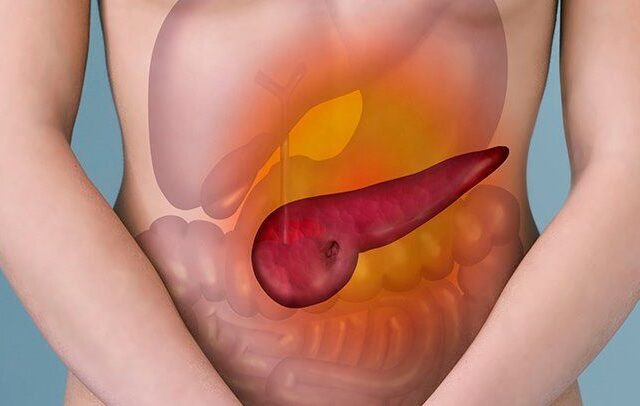
Chronic Pancreatitis Treatment in Hyderabad
Chronic pancreatitis is a long-lasting inflammation of the pancreas that gradually damages the organ and affects digestion, nutrition, and overall health. Unlike acute pancreatitis, which develops suddenly, chronic pancreatitis progresses slowly and requires timely diagnosis and advanced treatment. If you or your loved one is looking for the best chronic pancreatitis treatment in Hyderabad, our specialized gastro and surgical team is here to provide comprehensive care.
What Is Chronic Pancreatitis?
Common Causes
- Excessive alcohol intake – one of the leading risk factors
- Gallstones – block the pancreatic duct and trigger inflammation
- Genetic factors – hereditary pancreatitis
- Autoimmune conditions – where the immune system attacks the pancreas
- Other factors – high triglycerides, smoking, medications, or prior acute pancreatitis
Symptoms to Watch For
Chronic pancreatitis may show signs such as:
- Continuous or recurring upper abdominal pain (radiating to the back)
- Nausea, vomiting, and indigestion
- Weight loss due to poor absorption of food
- Oily, foul-smelling stools (steatorrhea)
- Signs of diabetes (in advanced stages)
If you notice these symptoms, consult a gastroenterologist immediately. Early treatment prevents complications and improves long-term outcomes.
Diagnosis
To confirm chronic pancreatitis, specialists may recommend:
- Blood tests – to check pancreatic enzyme levels
- Ultrasound or CT scans – to detect structural changes in the pancreas
- MRI / MRCP – advanced imaging to examine bile and pancreatic ducts
Endoscopic ultrasound (EUS) – for detailed evaluation
Treatment Options for Chronic Pancreatitis in Hyderabad
Treatment depends on the severity of the condition and the patient’s overall health. Our center offers a complete range of therapies including:
- Lifestyle & Medical Management
- Avoiding alcohol and smoking
- Pain management medications
- Pancreatic enzyme replacement therapy to improve digestion
- Nutritional supplements for vitamin deficiencies
- Avoiding alcohol and smoking
- Endoscopic Treatments
- ERCP (Endoscopic Retrograde Cholangiopancreatography) to remove blockages or place stents
- Stone removal from pancreatic ducts
- ERCP (Endoscopic Retrograde Cholangiopancreatography) to remove blockages or place stents
- Surgical Treatments
- Drainage procedures to relieve blocked ducts
- Resection surgeries to remove diseased portions of the pancreas
- Total pancreatectomy with islet cell transplantation in select cases
- Drainage procedures to relieve blocked ducts
Our team of expert gastroenterologists and surgeons ensures safe, effective, and patient-centric treatment tailored to each case.
Why Choose Us for Chronic Pancreatitis Treatment in Hyderabad?
- Experienced specialists in gastroenterology and pancreatic surgery
- Advanced diagnostic facilities (MRI, MRCP, ERCP, EUS)
- Comprehensive care from diagnosis to surgery to post-treatment nutrition
- Multidisciplinary team including surgeons, dietitians, and endocrinologists
- Personalized treatment plans with long-term monitoring and follow-ups
Recovery & Long-Term Care
Chronic pancreatitis requires ongoing care even after treatment. Patients are guided with:
- Special diet plans to improve digestion
- Pain management strategies
- Lifestyle modifications to prevent flare-ups
- Regular monitoring for complications like diabetes and pancreatic cancer
Conclusion
If you are searching for chronic pancreatitis treatment in Hyderabad, we are committed to delivering world-class care with advanced technology and a patient-first approach. With early diagnosis, expert treatment, and proper aftercare, patients can lead a healthier and more comfortable life.
Contact us today to book a consultation and take the first step towards recovery.
FAQs
What is chronic pancreatitis?
Chronic pancreatitis is long-term inflammation of the pancreas that causes permanent damage, pain, and digestive problems. It often requires medical, endoscopic, or surgical treatment.
What are the main causes of chronic pancreatitis?
Common causes include heavy alcohol consumption, gallstones, genetic factors, autoimmune disorders, smoking, and high triglyceride levels.
How is chronic pancreatitis diagnosed?
Doctors use blood tests, ultrasound, CT scans, MRI/MRCP, and endoscopic ultrasound (EUS) to confirm the condition and assess its severity.
Can chronic pancreatitis be cured?
While it cannot always be fully reversed, proper treatment—such as lifestyle changes, enzyme replacement therapy, endoscopic procedures, or surgery—can manage symptoms and prevent complications.
Who provides the best chronic pancreatitis treatment in Hyderabad?
Our experienced gastroenterologists and pancreatic surgeons offer advanced diagnostic tools, minimally invasive procedures, and holistic care for the best possible outcomes.









